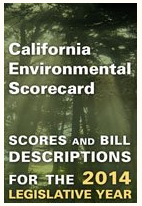
It's scorecard season in California. Advocacy groups are giving grades to legislators based on how they voted on bills in the last year's sessions, and releasing the scores just in time to influence next week's election.
The California League of Conservation Voters (CLCV) and the Sierra Club both scored legislators according to how they voted on environmental issues, some of them germane to transportation.
The Sierra Club's scorecard headline is: 2014: Environmental Power Unifies and Wins.
The CLCV added an additional score this year, dinging fifteen Assemblymembers who signed a letter to the California Air Resources Board Chair Mary Nichols begging her to postpone the application of cap-and-trade to fuels in January.
“Considering the severity and scope of the assault on AB 32, CLCV takes the historic step — the first time in more than forty years of scoring the Legislature – of negatively scoring the signatories to the letters as if they had cast a vote against AB 32 implementation," said the League in a press release. "We take this unprecedented action to make it clear to lawmakers that their public support or opposition to state laws that tackle climate change will be part of their permanent record of environmental performance we share with our members, other environmental advocates, and the media."
CLCV's scorecard takes a comprehensive look at votes and outcomes of the many bills introduced in the last few years—going back to 2005--including bills on clean vehicle technology, fracking, solar power, the plastic bag ban, and other environmental issues. For example, S.B. 1532, which created that framework for allocating cap-and-trade funds towards projects that reduce greenhouse gas emissions, was passed by the governor. Each Senator and Assemblymember who voted for it are given credit, and those who voted against it have it marked as an “anti-environmental vote.”
Hint: the breakdown is pretty much along party lines.
The Governor gets a grade, too—in this case he signed the bill, so he got a positive score.
In the 2014 session, “environmental advocates achieved ... many historic victories despite the powerful opposition and lavish spending from wealthy, polluting industries and their allies in the Legislature,” says the CLCV website. “Of the eighteen bills CLCV scored this year, thirteen passed the Legislature and made it to Governor Jerry Brown’s desk; he signed all but one into law. Compare that to the previous year, when only nine of the eighteen bills CLCV scored made it all the way to the Governor’s desk, with eight signed and one vetoed.”
The website also points to the “unfinished business” of protecting Californians from the risks of fracking. For example, SB 1132 from Holly Mitchell (D-Los Angeles), would have placed a moratorium on fracking, acidizing and other risky drilling methods, but it failed to pass on the Senate floor.
Interestingly, between 2013 and 2014 almost every group's score went up; that is, the number of legislators voting “the right way” on environmental issues increased, including Republicans in both houses. Democrats as a group earned the same scores in both years: 87 percent in the Assembly and 90 percent in the Senate.
CLCV gave a perfect score (100 percent) to the following legislators (all of them Democrats):
Senators:
Jim Beall (Santa Clara), Ellen Corbett (East Bay), Mark DeSaulnier (Concord), Mark Leno (San Francisco), Ted Lieu (Los Angeles), Carol Liu (La Canada-Flintridge), Holly Mitchell (Los Angeles), William Monning (Carmel), Alex Padilla (Pacoima), Fran Pavley (Agoura Hills), Darrell Steinberg (Sacramento), Lois Wolk (Davis)
Assemblymembers:
Tom Ammiano (San Francisco), Toni Atkins (San Diego), Richard Bloom (Santa Monica), Rob Bonta (San Leandro), Ed Chau (Monterey Park), Roger Dickinson (Sacramento), Paul Fong (San Jose), Mike Gatto (Los Angeles), Jimmy Gomez (Northeast Los Angeles), Richard S. Gordon (Menlo Park), Marc Levine (San Rafael), Bonnie Lowenthal (Long Beach), Kevin Mullin (San Mateo), Al Muratsuchi (Torrance), Adrin Nazarian (Sherman Oaks), John Pérez (Los Angeles), V. Manuel Pérez (Coachella), Anthony Rendon (Lakewood), Nancy Skinner (Berkeley), Mark Stone (Monterey Bay), Philip Ting (San Francisco), Bob Wieckowski (Fremont), Das Williams (Carpinteria), Mariko Yamada (Davis)
Governor Jerry Brown received a score of 92% from the CLCV. The Sierra Club gave him a perfect score, but acknowledged that he was able to earn it because several challenges to the oil industry, including the fracking moratorium, never made it to his desk, where he may have vetoed them.
Ballotpedia has a somewhat comprehensive list of scorecards put out by organizations that include labor organizations, equity advocates, special interest and advocacy groups, and think tanks, although it needs updating.





